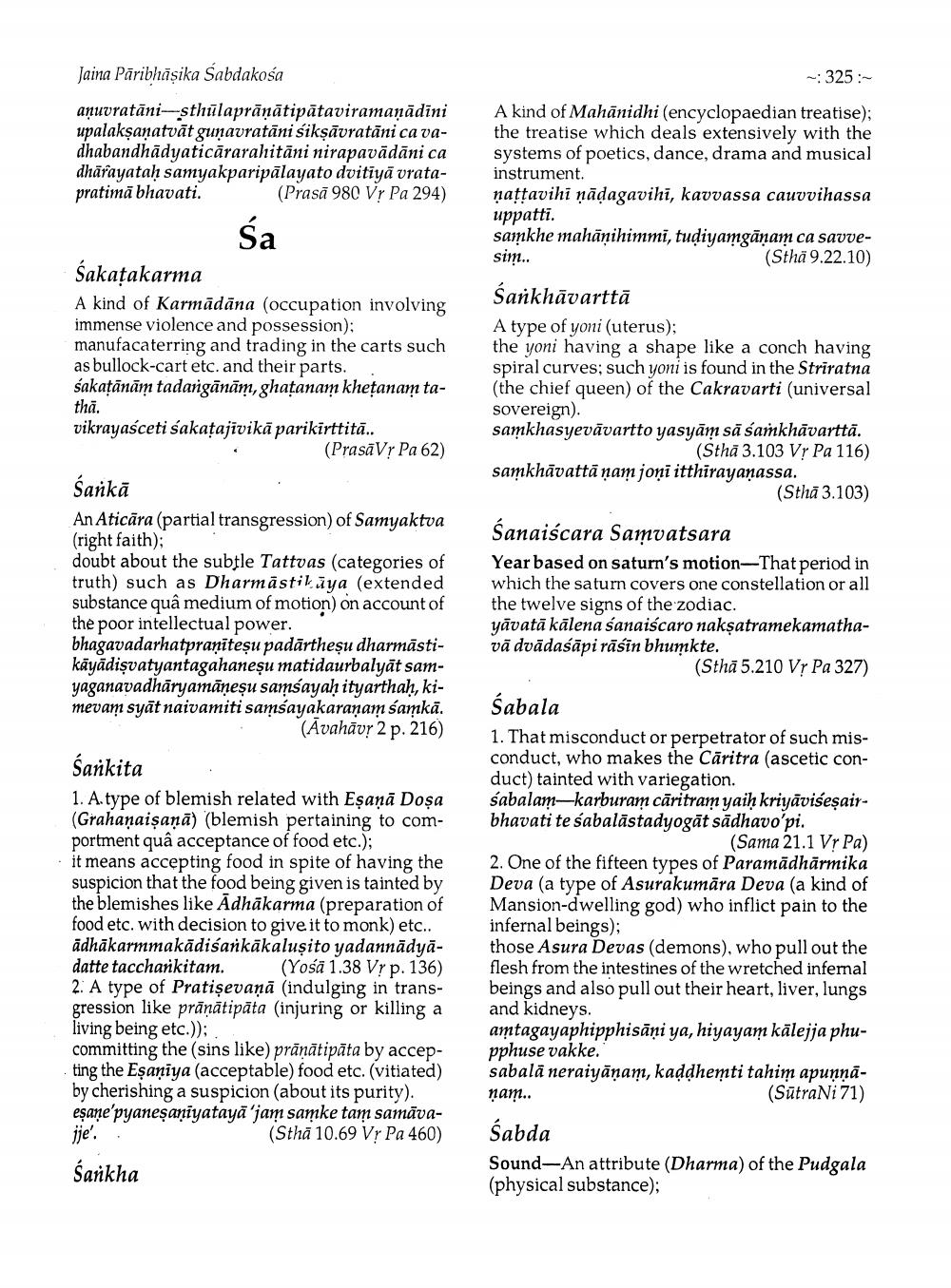________________
Jaina Pāribhāșika Sabdakosa
325:
anuvratāni-sthūlaprānātipātaviramaņādini upalakṣaṇatvāt gunavratāni śikṣāvratāni ca vadhabandhādyaticărarahitāni nirapavādāni ca dhārayatah samyakparipālayato dvitiyā vratapratimā bhavati. (Prasā 980 V; Pa 294)
A kind of Mahānidhi (encyclopaedian treatise); the treatise which deals extensively with the systems of poetics, dance, drama and musical instrument nattavihi ņādagavihi, kavvassa cauvvihassa uppatti. sainkhe mahānihimmi, tudiyamgānam ca savvesim..
(Stha 9.22.10)
Śarkhāvarttā A type of yoni (uterus); the yoni having a shape like a conch having spiral curves; such yoni is found in the Striratna (the chief queen) of the Cakravarti (universal sovereign). samkhasyevāvartto yasyām sāśamkhāvarttā.
(Stha 3.103 Vy Pa 116) samkhāvattā ņam joni itthirayaņassa.
(Sthā 3.103)
Śanaiscara Samvatsara Year based on saturn's motion-That period in which the saturn covers one constellation or all the twelve signs of the zodiac. yāvatā kālena sanaiscaro nakşatramekamathavā dvādaśāpi rāśin bhumkte.
(Sthā 5.210 V; Pa 327)
Sakatakarma A kind of Karmādāna (occupation involving immense violence and possession); manufacaterring and trading in the carts such as bullock-cart etc. and their parts. sakațānām tadargānām, ghatanam khețanam tathā. vikrayasceti sakatajivikä parikirttitā..
(PrasāVỊ Pa 62) Sankā An Aticāra (partial transgression) of Samyaktva (right faith); doubt about the subtle Tattvas (categories of truth) such as Dharmāstilāya (extended substance quâ medium of motion on account of the poor intellectual power. bhagavadarhatpranitesu padārtheşu dharmāstikāyādisvatyantagahanesu matidaurbalyāt samyaganavadhāryamāņeşu samsayahityarthaḥ, kimevam syāt naivamiti samsayakaranam samkā.
(Āvahāvs 2 p. 216) Śarkita 1. A. type of blemish related with Eşaņā Dosa (Grahaņaişaņā) (blemish pertaining to comportment quâ acceptance of food etc.); it means accepting food in spite of having the suspicion that the food being given is tainted by the blemishes like Adhākarma (preparation of food etc. with decision to give it to monk) etc.. ādhākarmmakādisankäkaluşito yadannadyadatte taccharikitam. (Yośä 1.38 V, p. 136) 2. A type of Pratişevaņā (indulging in transgression like prāņātipāta (injuring or killing a living being etc.)); committing the (sins like) prāņātipāta by accepting the Eṣaṇīya (acceptable) food etc. (vitiated) by cherishing a suspicion (about its purity). eşane'pyanesaņiyatayā'jam samke tam samāvajje'. .
(Sthā 10.69 Vr Pa 460)
Śabala 1. That misconduct or perpetrator of such misconduct, who makes the Caritra (ascetic conduct) tainted with variegation. sabalam-karburam cāritram yaiḥ kriyāvišeşairbhavati te śabalāstadyogāt sādhavo'pi.
(Sama 21.1 Vr Pa) 2. One of the fifteen types of Paramādhārmika Deva (a type of Asurakumāra Deva (a kind of Mansion-dwelling god) who inflict pain to the infernal beings); those Asura Devas (demons), who pull out the flesh from the intestines of the wretched infernal beings and also pull out their heart, liver, lungs and kidneys. amtagayaphipphisāņi ya, hiyayam kālejja phupphuse vakke. sabalā neraiyāṇam, kaddhesti tahim apunņānam..
(SūtraNi 71)
Śabda Sound-An attribute (Dharma) of the Pudgala (physical substance);
Sarkha




